This morning I found myself as the only man attending a networking brunch sponsored by the Milwaukee Muslim Woman’s Coalition at the Islamic Center. The guest speaker was an African American woman from the National Alliance for Mental Illness,(NAMI) talking about “The Stigma of Mental Illness.” I was there because of my deep interest in the stigma of mental illness, something I have experienced and written about, just a week or so ago having a letter to the editor on the subject and having been part of the local newspaper’s forum on mental illness at Marquette University law school and many other related activities.
Sadly my interest in mental illnesses and the stigma it generates began when my son, Peter became ill in 1992 and has lasted through his death in 2010. Through him I got to understand the terrible weight of stigma and how stigma stains the soul.
The sponsor group, The Milwaukee Muslim Woman’s Coalition, also got my interest since I have been impressed by their activities and the important role they play in the community, particularly in the Muslim community. The American stigma of Muslim Women is easily erased when you meet these women.
The speaker from NAMI was excellent when talking about how mental illnesses are like any other illnesses, like cancer or diabetes and should be treated that way and not as a character flaw. However, NAMI, locally, has joined a growing number of social agencies and politicians calling for the tearing down of the present Behavior Health Complex and replacing it with community based program. I am no fan of the mental health complex in Milwaukee. I have seen its deterioration in the hands of politicians, Democratic and Republican, by lack of funding for mental health. However, tearing it down and using the money for community programs is not the answer.
As the speaker suggested mental illnesses should be treated as any other illnesses, injury or disease with a comprehensive mental health care system with hospital, rehabilitation and treatment centers as well as community program. No one is talking about where the money for hospital care, treatment centers will come from.
In the 80’s where there was a massive amount of people put away in major institutions there was a call to empty the homes for mental health and give them community care. Thousands and thousands were released from mental health institutions only to find there was no money for building medical care hospitals, rehab centers, home and community program. Do we need to learn the lesson all over again, closing institutions without money committed for a comprehensive system like other illnesses will just mean, as it did in the 80’s, more men and women with mental illnesses on the streets and in jails.
When we will ever learn that moving money from one underfunded type of care to another underfunded type of care and not dealing with the sources and treatment of mental illnesses will just cost us more.
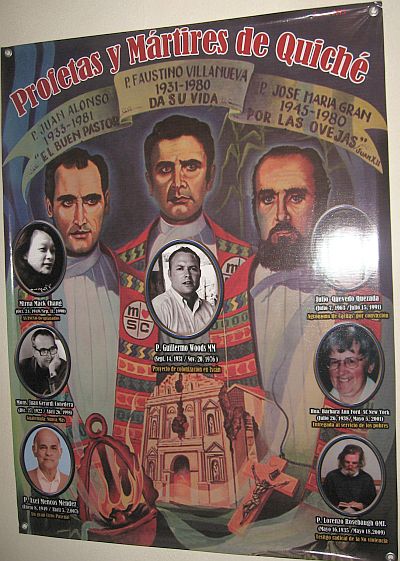
Prophets & Martyrs of Quiche In Guatemala with SOA Watch delegation we went to visit Bishop Ramazzini of Huehuetenabgo one of the worst hit errors during the massacres of Mayans by the military of the government. The Bishop was noted as a human rights advocate and on the way in to the meeting room we noticed a poster on the wall of “prophets and martyrs” of the region. Both Roy Bourgeois, the founder of SOA Watch and I knew one of the persons picture on the poster in the bottom right hand corner, Padre Lorenzo Rosebaugh OMI. I knew him since the days of the Milwaukee 14 action in 1968. Roy knew him for a long time and Lorenzo, Roy and another person committed the first act of civil disobedience at the School of America’s training base for Latin American military in Fort Benning, GA.
Right before returning to the USA from years of work in Guatemala Lorenzo had been shot when driving a car with other Oblate priests in the area where he had served and the place of much violence against the indigenous people and priest and nuns who worked with them. His religious order said he was killed in a car robbery but many people in the area and others that new Lorenzo, a simple and humble man, thought differently. During the question and answer period Roy asked the Bishop about the circumstances of Lorenzo’s death. He did not add much more to the information except to say they had found the gun that killed Lorenzo not the killers.
In my 2006 trip to Guatemala I had met Lorenzo in Guatemala City and taken a picture of him that was used by the media in reports of his death. The pictured captured the spirit of Lorenzo. The one in the corner of the poster captured a sadder Lorenzo. Both pictures are below.
Many who knew him in Latin America and the USA consider him a Saint, a holy man that was very humble. He stayed at our house the last couple of visits to the USA where he was ordered by superiors to write down his life story and have it published. The book, “Wisdom Through Failure” was not a bestselling but a powerful book to all that read it. As they say in the vigil of those who died in Latin America as a result of our military training of soldiers, “Lorenzo Rosebaugh, Presente!
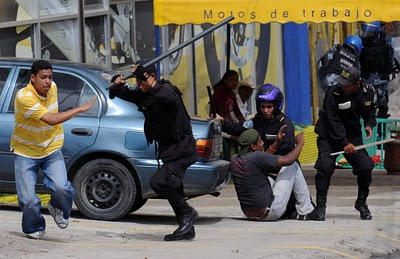
State repression on streets
of Honduras. Racism and militarism go hand in hand. Where you find one, in Guatemala or the USA, you find the other. I was reminded of that fact today when one of companions in the SOA Watch delegation to Guatemala wrote an article for ‘counterpunch’ published online today called A Taxonomy of Racism from Alvarado to Zimmerman. He talks about a poster we saw in Casa de la Memorial, or House of Memory, a new museum in Guatemala City. On the poster there are 16 classifications of persons based on the race of the child, with light skin being the best and dark skin being on the bottom. I noticed on TV and advertising signs that attractive light skin woman with blond hair are featured.
Armed militia, be they national police or private security is everywhere, each equipped with an automatic rifle ready to shoot. Since the USA staged coup of a democratic Guatemala in 1954 the military has ruled. Guatemalan soldiers are sent to the School of Americas at Fort Benning, GA to learn how to kill and torture more effectively and return home to practice their skills.
In the USA racism and militarism are more subtle but just as deadly. The USA spends more on military spending than the other top ten nations in the world. No one comes close. In a recent budget for discretionary spending 57% of US spending was for the military. If you look at the M.A.P.S., Maps of Segregation, Poverty, Criminalization it is clear that African Americans are regulated to the poorest area of Milwaukee, the most criminalized with high unemployment, lack of transportation and poor schools. People in the USA do not like to call it ‘racism’, or even worst institutional racism but it is. If you talk sincerely and honestly to African American staff, faculty and students at Marquette University you will hear stories of racism. If you talk to white students at Marquette you will hear how racially diverse the campus is. Marquette is also the only university or college in the six county area to host three departments of military training, Army, Navy/Marines and Air Force, teaching war, violence and killing.
The common premise of racism and militarism seems to be that the other person is less a human that we are. To easily kill the enemy or to discriminate against another we need to consider them less a human being than we are. At the bottom of the poster in the museum in Guatemala it says “Todos somos gente” – we are all people. In our Declaration of Independence it says “all men are created equal.” These statements are true but in practice leaders in Guatemala and the USA say we are all people, but some of us are exceptional and that some of us are more equal than others.
Racism and Militarization, hand and hand, are two big sins of our culture and that of Guatemala that breed inequality, death and destruction. “When will we ever learn?”
One thing I enjoyed in Guatemala was that there was no talk with people or politicians about voting for “the lesser of two evils.” The people and the parties were clear; there were the “powers that be”, the oppressors and the people that were poor and marginalized, the oppressed. The clarity between good and evil, greedy and needy was obvious.
In the USA we claim to have two political parties but in reality, the people in power control both parties. When I point out to people who vote that the person they elected performs evil deeds, like using “killer drones” or favoring the wealthy who gave them the money to win, they usually say they voted for “the lesser of two evils.” I never understood this because a ‘lesser evil’ is still evil.
But somehow in the USA we have developed this thought pattern that the “end justifies the means”. We can starve and kill innocent children as long as our goal is okay. For example, Madeleine Albright, the secretary of state under President Clinton once told a reporter, rather matter-of-factly on national television, that the 500,000 Iraqi children killed in enforcing William Clinton’s sanctions against Iraq was a price that was “worth paying” in order to foster U.S. interests there.
In the USA we talked about achieving ‘peace through use of military power’, a contradiction if there was ever any. Pope Francis says “Faith and Violence are Incompatible” and his homily this morning said “War is a scandal to be mourned every day.” (The full homily is below).
When we give in and choose the “lesser of two evils” evil demands more and more of us. Evil is evil and there is no “lesser of two evils.”
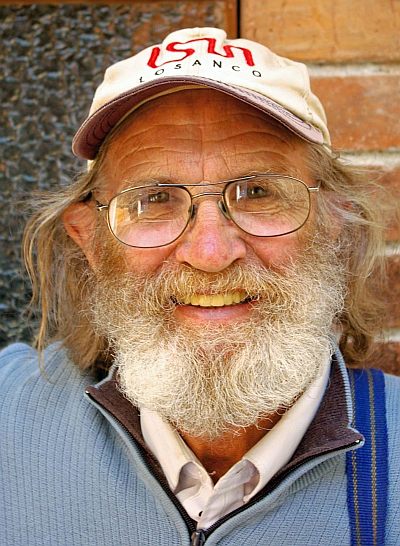
Lorenzo Rosebaugh OMI
RIP 1935–2009I returned yesterday from a week in Guatemala with a SOA Watch delegation. This was my second visit to Guatemala. The first visit was with Global Awareness Through Experience (GATE) in 2006. That visit was during Holy Week and was a true cultural experience meeting with Mayan people in the country. I recorded that visit in a pictorial essay called Buried in Guatemala. That title came from our experience of Good Friday, our last day, and how the people of Guatemala found such great joy in the suffering and death of Jesus. Good Friday was the biggest holiday of the year. During this visit I got to meet with my old friend, Lorenzo Rosebaugh from the Milwaukee 14 days. He was working with poor, dying and ill in Guatemala City.
This trip was to show solidarity with the Mayan people who have suffered and been suppressed in their struggle for freedom from the greed of mining industry, military and politicians. They have suffered at the hands of military trained at the School of Americas at Fort Benning Ga. We met with people imprisoned and tortured in the struggle for rights of the people. This time I saw my friend Lorenzo’s picture on a poster outside of a meeting room with the Bishop of a province. He had been killed, martyred as they say, in 2009 in Guatemala.
On our last day a poem was read to us from Julia Esquival, a Guatemalan woman who had been in exile and someone we met at our first visit. The poem is called “They Have Threatened us with Resurrection” and it makes a good title for my reflections on this journey. The reflections and pictures will come soon but for now here is the full poem below.
Since my son became ill in the early 90’s I have been involved in understanding and advocating for persons with mental health illnesses. Like persons on all sides of the issue, I agree that the mental health system in Milwaukee County and elsewhere in the USA has failed us. I felt that same way about the welfare system of old. Yet like the welfare system some are taking advantage of the broken system by advocating a new system that will even, in my opinion, hurtful to persons in need. For mental health it is now the rush for the Governor to take over the system and run it with the help of an appointed volunteer board.
The Governor is the same person as County Executive of Milwaukee County oversaw the downfall of the system. The present County Executive supports this new bill which turns over control to the Governor’s board. Parents with bad experience in the present system, like we did, and agencies who want more funding, are supporting this ‘quick fix’ takeover.
The legislature is on a fast track to pass this bill. We do need a change in care for persons with mental illnesses but this takeover by the Governor would be a setback.
It has been two months, time required between publications, since my last letter to the editor was published, so I sent off this one. Published or not it will probably not make much of a difference since one again the ‘voice of voiceless’ will not be heard and “powers that be” will take advantage of this tragedy of how we care for this particular illness to their own advantage.
Here is the letter.
Letter to Editor Medical Care for Mental Health
For months I have been meaning to write to support a “basic medical care” for persons with mental health illnesses by use of hospitals, treatment facilities and community programs. Now I may be too late as bill is in the legislature turning Milwaukee County’s mental health system over to Governor Walker’s appointed board.
Other illness or diseases, like cancer, diabetes, or heart problems, are treated as medical issues with basic medical care from public and private care facilities. We would not consider turning over basic medical care for any other illnesses or diseases to a board appointed by the governor.
A person seriously injured in a car accident or one having a heart attack, conscious or unconscious will be taken to a hospital and receive treatment for the duration necessary. A person who has a serious mental health breakdown, conscious or unconscious, will be taken to jail or the mental health complex and most likely released without treatment in a few days.
How about creating a fully funded medical health care system for mental health illnesses or brain diseases by private and public hospitals, rehabilitation and treatment centers and community health programs to be utilized just like we do with other illnesses and diseases?

Pete Seeger, 1919–2014, sang
out for peace and justice
not money After passing out flyers to Marquette University students today about ‘What Pope Francis says’ and ‘What Marquette does’ about teaching war, violence and killing, two of us decided to attend the Mass at 12:05pm at Gesu, the church on campus. After mass as we were walking across Wisconsin Avenue to our car and a reporter and cameraman stopped us and asked if they could ask us a question. As my friend slipped away I stayed. The reporter asks me what I thought about the Archdiocese finally presenting a plan to settle claims resulting from sexual abuse scandal in the bankruptcy hearing. I did not know what the plan consist of so just talked about my concern that the Catholic Church be honest and practice full disclosure about its financing. I did mention how our Church was closed and we still do not have a full disclosure of what happened to the money, two and half years later. Fresh from my witness at Marquette I quoted St. Ignatius of Loyola, founder of the Society of Jesus, Jesuits, who said: “Love best express itself in deeds over words.”
On the five-o-clock and six-o- clock news I learned how little the Catholic Archdiocese were offering victims of sexual abuse with almost three times more money going to legal fees. The Archbishop talked about how we in the Catholic Archdiocese need to do ‘penance’ since we now will be 7 million dollars in debt to lawyers if the Judge in the bankruptcy accepts their plan. He talks about continuing our mission to act on the Gospels. My thought is that I am not paying for the ‘sins’ of our fathers but do my best to act on the Gospel by serving the poor and marginalized not the rich lawyers.
Our church that the Archdiocese closed was a merged Church, consisting of three Catholic Churches brought together in 1993. One of the Churches closed by the Archdiocese was doing very well and was on valuable land. However, the Archdiocese got into a legal fight with the church that purchased the property and wasted away on legal fees in a losing court case a majority of the money.
Money from the Department of Defense seems to be at the heart of why Marquette University teaching violence and killing on campus and concern about money seems to be why the Archdiocese spent so much money to keep their money from the victims of the sexual abuse scandal.
My Open Letter to the Archbishop for full disclosure of money realized from closing and sale of Blessed Trinity Catholic Church appears below. We know that almost all the money went into an endowment fund for “future Catholic Church”. A Church attached to money is not a Church of Peace and Justice. Making money or doing peace and justice, sadly is the question for the Catholic Church in Milwaukee.
Tender Look - Tuesday, February 11, 2014

“Love is an act of endless
forgiveness, a tender look which
becomes a habit.” (Peter Ustinov)I daily receive two quotes with pictures. One of the quotes today, by Peter Ustinov, struck me as relevant to my thinking these days. “Love is an act of endless forgiveness, a tender look which becomes a habit.” Being forgiving and accepting forgiveness, as I have said before, is tough not only with enemies but with friends.
Love being a “tender look which becomes a habit” reminds me of almost the opposite saying, the Eastern saying, “desire is the source of all suffering.”
If we are looking for more, more stuff, more friends, more acceptance we will suffer when we do not find it. If we take a “tender look” at life we can see that what we have, no matter how much or less, is a gift and blessing that fills us with gratitude.
I was telling one friend about someone who was stigmatized and poor. My friend, poor and stigmatized himself, is always looking for more of life. After my comment he said that I was making him more appreciative and grateful for the life he had.
When I was in Guatemala some years ago I noticed that many poor people with not many things in life were full of joy and gratitude. They desired very little and had made a habit of a ‘tender look’ at life. They even found joy and gratitude in death and celebrated Good Friday as the major feast day of the year. (See Buried in Guatemala.)
Getting free of ‘desire’ is difficult but is made easier when we take a ‘tender look’ at life.
We went to dinner tonight at Bombay Sweets, a small Indian vegetarian restaurant and bakery with an old friend, someone we have known since the sixties. For many years he has run a small transcribing business and been active in issues like bus and bike transportation. It is good to update our lives with friends we too not often see.
With all the good issues we all been involved with reminded how diverse the concerns and issues are today. In the sixties we came together around two main issues, resistance to war in Vietnam and civil rights issues. The same people were involved in both and we worked together. Today there many issues, lots about the environment, war and peace, poverty and justice, abortion, taxes, drones, NSA and on and on. Each day I seem to get a number of emails, some requesting signing of petition or writing letters on many issues. Diversity of concerns can be good but often he can lead to divisiveness with so many issues that we get distracted and just go from one to another. As one old friend activist told me a few years ago that I had my issues, like ROTC at Marquette, and he had his issues like lifting the boycott of Cuba.
This attitude of each person getting his or her issue and many diverse groups of activates around so many concerns, seldom working together, to me, allows the “powers that be” to be on the offensive and we are the defensive. We support each other at times but there are so many issues that you can go from talk to talk each night for a month and get information on many issues but take no action. Each time we seemed to get focus on one issue, so many more are thrown at us that we go on the defensive once again.
Our old friend asked me tonight what do we do about this diversity which leads to distraction rather than unity and I did not know the answer. I had thought of getting a bunch of groups together, agreeing to focus on one issue of one group, something that is ‘winnable’ and then moving on. But soon I learned I could not accomplish that; we all had on ‘own concerns’ that we thought that they need all our attention or we jump around from issue to issue, talk to talk, not stopping to take action. I keep on thinking about that question and if anyone has an answer please share. Diversity can be distracting.
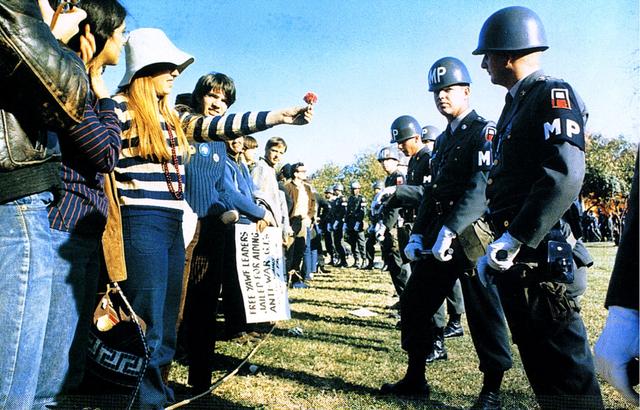
Flower Power Action A friend called tonight and said he had just completed a social justice program at his Catholic Church. I said that was good and what ‘action’ did he plan to take now. He said the program was not about ‘action’ on justice issues but about information, particularly on immigration. I find that much of what the Catholic Church says about peace and social action is just words and information and seldom leads to action.
Be it teaching on war and military what the Church says about ‘killing’ is not practiced in what Marquette University does. The Catholic Church’s teaching on the ‘preferential option for the poor’ had nothing to do with how the Milwaukee Archdiocese dealt with million dollars plus it received from closing a Catholic Church in area of poverty, segregation and injustice.
In fact what happened to the million plus the Archdiocese received from closing Blessed Trinity Church over two and one half years ago. I know bits of pieces of what happened to the Milwaukee but the disposal of the money has been done in secretly and behind closed doors. I wrote a draft of an open letter today to the Archbishop asking what happened with monies realized from closing this Catholic Church in an area of great need.
As Marquette University ignores our request for Marquette to be faithful to the Gospel and No Longer Host Departments of Military Science on campus so the Archbishop and the Catholic Church will probably ignore our request for full disclosure of the million dollars plus.
All the talk in the world, even by Pope Francis, will not make a difference in the struggle for truth and nonviolence in justice and peace issues. Reasoning does not seem to work. Gandhi says satyagrahi, the nonviolent struggle for truth “strives to reach reason through the heart. The method of reaching the heart is to awaken public opinion.”
Action not information is the way of the heart. In today’s culture and church we have too much information and not enough action, awakening public opinion.
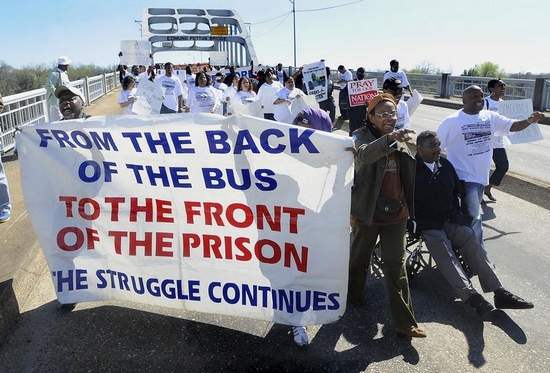
“The New Jim Crow” Now that the Archdiocese has disbursed the 1 – 1.5 million it received from the closing and sale of Blessed Trinity Church in North Central Milwaukee it time for the Catholic Church to give a full and transparent accounting of the money received and how it was disbursed. The Catholic Church, sadly, is not known for openness and transparency. The continual revelations of the sexual abuse scandal in the Church is a good example. Secrecy seems to be the norm. The sins of our Fathers linger on as those responsible for the cover up continue to hide. The Catholic Church, in my life time, is known for preaching but not practicing what it says. In closing yet another Catholic Church in North Central Milwaukee, the poorest, most segregated and criminalized area in Milwaukee the tradition of structural racism continues.
If the Archdiocese speaks the truth or avoids it or misrepresents it, the truth will come out. In this day and age of media and communication it is hard to hide reality.
The word ‘racism’ is one you do not hear much today but it is alive and well in the Catholic Church and in society. It is no accident that the area the Catholic Church abandoned consists of low income African Americas who have been stigmatized, isolated and ignored.
I have been reading the book “The New Jim Crow, Mass Incarceration in the Age of Colorblindness.” The author, Michelle Alexander, details how modern day racism is not overt, like using the N word, but just as damaging by establishing a structure of racism which people can deny.
In 2007 I wrote an essay ”The Sweet Waters of Discrimination in Milwaukee”. Times change and I am thinking of updating the essay. However, now I would call it “The Sweet Waters of Racism in Milwaukee”]]. Some will not like the change of the word from segregation to racism but that is what it is and we must as well as call it by what it is.
Some young people think that racism ended when President Obama, the first African American, was elected President. In my opinion his election was used to divert attention away from the growing racism of society. The New Jim Crow is more secret than the original but just as harmful. Segregation today is better called what it is ‘racism’.

“All truths are easy to understand
once they are discovered; the
point is to discover them.”
Galileo Galilei Today was my oldest son birthday. Remembering his age made me think of my age and how after so many years I am still struggling to find justice and peace in everyday life. It is somewhat depressing to think how we are losing support in our efforts, since 1969, to end the military presence and teaching on campus. It is also discouraging to hear how the Catholic Archdiocese decided to close another church in North Central Milwaukee and, despite many pleas for the poor, to store the resulting money in a bank trust fund for ‘future’ use.
Tonight I heard a talk at Marquette by a moral theologian who I deeply respect. He was talking about racism in our society and I feared he would talk in general. But he did not. He used Milwaukee, and specifically North Central Milwaukee, as example of racism was structurally built in our city. He used diagrams and maps to make his point as I did with M.A.P.S., Maps of Segregation, Poverty, Criminalization of African Americans and the Catholic Churches in North Central Milwaukee.
After his talk I asked a question of what we can do in face of the history and continual racism of the Catholic Church in Milwaukee. He said that for him he was able to keep his faith as long as he was able to keep speaking out, expressing his conscience and speaking truth to power. As long as he could be a ‘truth seeker’ he was not going to get discouraged. This is just what I needed to hear since, as reported in yesterday’s posting, I have been feeling ‘out of place’ and discouraged the last few days.
Tonight a friend from our struggle to stop R.O.T.C., military training on the Marquette University, came over and we talked about our experience of our message being ignored Tuesday night at Marquette University and what do we do next. I do not know what we do next; we will need to sit down and brainstorm some new tactics to communicate our message. However, I do know that perseverance in seeking the ‘truth’ is necessary. “Do you own thing” or “you have your opinion and I have my opinion does not mean much if our struggle for truth. We might never know the whole truth but must struggle to find it and be willing to enter into creative conflict in our journey.
The United Nations report on the priest sexual abuse scandal was released and was strong in saying how the Catholic Church was wrong by keeping secrecy all those years about the abuse and ignoring or hiding the truth. Some defenders of the Church pointed out how the policies of sexual abuse in the Church have changed. But there is still refusal to acknowledge the total past and still a lack of transparency in the Church not only on this matter but many other matters of faith and morals. “Father knows best” is still the sacred foundation of the hierarchical Church, meaning by ‘Father’ in the USA, mainly white, celibate. male, ordained priest.
As with military training on a Catholic University campus, as with sexual abuse by priest, as with woman’s ordination, as with the closing of churches and distributing its assets, the bottom line is still secrecy and hierarchical authority, “Father knows best.’ Only the ‘truth will set us free.”
After the keynote speaker on ‘Art and Practice of Forgiveness’ for Mission week at Marquette, a few friends went on to the stage with a banner of our Breaking the Silence message: Marquette Teaches Killing followed by banner saying Forgive Us. As they held up the sign people were talking, filing out and ignoring the message. I left the hall and went to reception outside the hall and felt out of place as people hurried to get in line for autographed books from the speaker or in line for refreshments. I felt lost in a sea of busyness.
This is not the first time I had this ‘out of place’ feeling. After hearing the inspiration story of this woman from Rwanda, the banner reminding me of how young men and women are put in a position “to kill or be killed” at Marquette University I felt alone and a strange person in a strange territory.
The feeling continues on to today as I had a hard time getting myself out of bed. I am a fairly good self-motivator but had a hard time getting going today. My advocacy to end Teaching war and killing at Marquette or my advocacy for less racism and segregation in the Catholic Church in Milwaukee did not seem very meaningful today. I wandered thru the day with a sense of hopelessness. But I made it and after cooking a nice meal for wife and myself tonight I felt better.
Doing is tough when you feel meaningless and out of place but faith keeps you going on, knowing that you are acting according to your conscience and being out of place is just part of the package.
In 2008 a friend took us to park, Lettuce Lake, outside of Tampa, Fl. It was there in that park that my fascination with orchids began. I was excited when my local discount food store had some beautiful orchards on sale. I purchased one and have done so many times since. Orchids last in their beauty for a long time but eventually the flowers die away. However, they are easy to care for, requiring only direct light and watering once and awhile. They often come back and flower again. The orchid on the right is one that came back from the dead and now shines in my living room. I have another one on the way back and a few more that are in dormant stages.
With the speaker at Marquette today, Immaculée Ilibagiza, a survivor of the genocide in Rwanda, speaking about forgiveness my thoughts have been focused on forgiveness. Somehow this orchard in my living room speaks forgiveness to me. It is partially because of the orchid’s beauty, and the beauty of true forgiveness, while the image of the orchid lingers in my mind. But it is more than that. As I tried to explain to my faith sharing group this morning the various stages of orchids, dormant, flowering and full beauty, speak to me of forgiveness. The need to give or receive forgiveness lingers in our soul at times. With awareness it begins to flourish and with acceptance it shines in our lives with all its beauty.
A question came up in our discussions about forgiveness: Is forgiveness possible without two parties, the one giving the forgiveness and the one accepting it, both agreeing. My answer is yes. Unconditional forgiveness, with or without acceptance, seems to be the norm for persons like Immaculee, Martin Luther King Jr., Gandhi and Jesus. We can forgive or ask for forgiveness but cannot control the other parties acceptance, rejection or ignoring our asking for or giving of forgiveness.
There are a few people now, past friends, who say to others that I have offended them. I have asked personally over and over again for reconciliation and forgiveness of my offenses, real or as they perceive them. They just continue to ignore my request for forgiveness or my forgiving them for what they have said behind my back about my character. I keep trying to ask for forgiveness but accept that all I can do is forgive them. Non-reciprocated forgiveness is hard but I must do it to free myself from the burden of not forgiving.
The orchid is forgiving of how it is cared for and continues to blossom with its beauty. Forgiveness is orchid, past, present and to come.
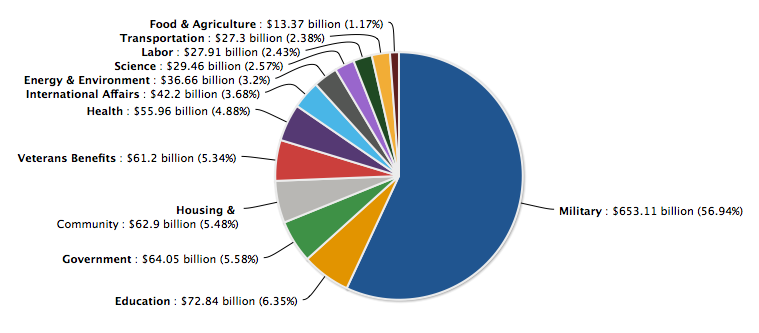
Where are money goes?
See Big Chart Below More and more the Republicans and Democrats are centralizing government into the hands of the few. Today in the newspaper I read how State Senators are proposing a bill that would put Milwaukee County mental programs into the hands of a committee appointed by our Governor. This is the same Governor who when coming to office lower taxes for everyone except the poor, for which he raised taxes. This is the same Governor who just cut thousands of low income persons from the State health care plan. This is the same Governor who has raised millions from outside of the State super rich persons, part of the 1% who controls 46% of our wealth.
The recent Federal budget compromises between congressional supported by conservative Republicans and Liberal Democrats gives 56.7% of all discretionary Federal spending to the military. (See chart on side and below). These are the same congressional persons who raise the most money from the rich and thus are elected 95% of the time.
Republican and Democratic Presidents are more and more using “executive orders” to get things done.
In the USA the people and lobby organizations who give the most money to politicians get the most money from the politicians who are elected with their money.
Politicians and Democrats talk about the ‘middle class’, a rapidly disappearing class of people has the gap between the very rich and poor widens.
The Supreme Count of the USA has ruled that corporations are persons and money is free speech, so it must be so!
More money means more power which means more money. Our military budget goes up and up while our people budget goes down and down.
Republicans talk against “big government” but create it by controlling more and more from the top down. Democrats talks about government of the people while taking away more and more government by the people. The 1% and “Big Money” rule. All the petitions, votes, phone calls in the world cannot bring big money down. What can we do to bring “big money down”?
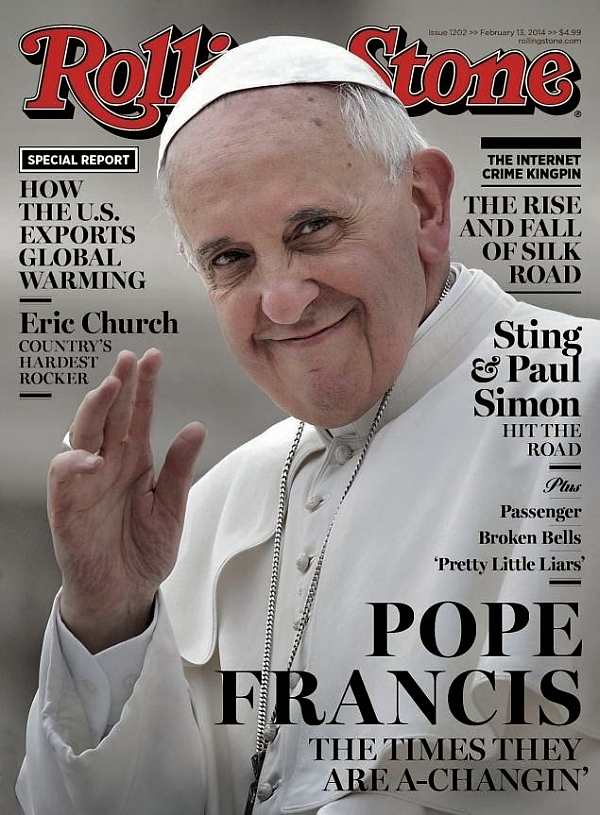
Pope Francis on cover of
“Rolling Stone” magazine In a 1967 speech titled Beyond Vietnam, A Time to Break the Silence Martin Luther King Jr. called for a “radical revolution of values”. It was not, in my opinion, so much as developing new values as it was going back to the values of the Gospel and our faith. The radical revolution was practicing these values that we claim to stand for.
Martin Luther King Jr. was breaking his silence about the war in Vietnam, an act that would cost him dearly. Today we need to break our silence about wars in Iraq and Afghanistan and the war here at home with the teaching of killing at a Jesuit Catholic University like Marquette University and Notre Dame as well as the segregation and racism of church.
The cost for Marquette University to for a “radical revolution of values” would be great, losing significant amount of income from donors and government. The cost to us to “break the silence” could mean being marginalized or treated as an outcast.
As I mentioned in last night’s posting we all face our moment of truth when we realize that we do not practice what we preach and what the cost of doing that will be. I believe this is why Pope Francis in his mission statement of the Church and its papacy says: “I prefer a church which is bruised, hurting and dirty because it has been out on the streets, rather than a church which is unhealthy from being confined and from clinging to its own security.” For the Pope is aware that if we and the Church are true to itself in today’s society, just like Martin Luther King Jr., it will be “bruised, hurting and dirty.”
Today a homeless man wandering into the Church during the most holy time we were receiving communion, the body and blood of Jesus Christ. He loudly proclaimed he was looking for a bathroom. I did not notice but my wife and friend did. I am sure this was a ‘dirty’ moment to some, this interruption of our sacred ritual. If we are to be a church of poor and marginalized, one that practices “love your enemies” there will be many more ‘dirty’ moments. Maybe accepting the bruises, hurt and dirty is what Martin Luther King Jr. was talking about as a “radical revolution of values.”
Tonight we went to see “Woody Sez”, the Life and Music of Woody Guthrie at the Strackner Cabaret at the Milwaukee Repertory Theater. The music of Woody Guthrie has always appealed to me. Although he sings of his times in the great depression, his lyrics ring true today. One of his songs, Tom Joad was based on John Steinbeck’s novel “Grapes of Wrath”. At the end of the novel, about the Joad family moving to California during the dust bowl of 30’s, Tom Joad has to leave the camp due to trouble he had defending a preacher friend. He wakes up his mother to say good- by and she asked when she will see him again. The end of the song is based on his response:
“Ever’body might be just one big soul,
Well it looks that a-way to me.
Everywhere that you look, in the day or night,
That’s where I’m a-gonna be, Ma,
That’s where I’m a-gonna be.
Wherever little children are hungry and cry,
Wherever people ain’t free.
Wherever men are fightin’ for their rights,
That’s where I’m a-gonna be, Ma.
That’s where I’m a-gonna be.”
Great persons of our times, Gandhi, Martin Luther King Jr. and Dorothy Day tell us we are all brothers and sisters and we need to be wherever people are hungry, homeless or fighting for their rights. To be in solidarity with the poor and marginalized is, as Pope Francis says of the Church, where we ought to be.
Today I saw a cartoon, side and below, about the top 1% of the world controlling 46% of world’s wealth. I am not in the top 1% but still live a privileged life but struggle to be where “people ain’t free.” “That is where I’m wanna be.